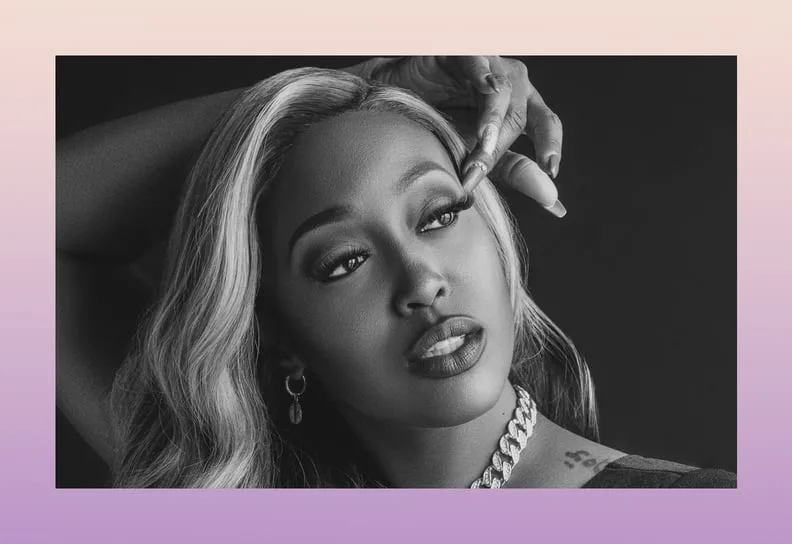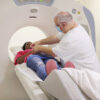
There are so many aspects of health that disproportionately affect the Black community, and yet less than six percent of US doctors are Black — a deficit that only further harms public health. Many of the Black folks who work in healthcare have dedicated their careers to combat inequities. That’s why, this Black History Month, PS is crowning our Black Health Heroes: physicians, sexologists, doulas, and more who are advocating for the Black community in their respective fields. Meet them all here.
“Get that dick!” Tyomi Morgan chanted as she mounted a giant unicorn stuffed animal and moved her hips from side to side. The certified sexologist, pleasure coach, and movement specialist was in the middle of teaching her legendary Cowgirl Workout class when she instructed her clients to move through a series of hip bridges and squats — exercises that one attendee said left her feeling “sexually charged.”
The Cowgirl Workout was brought to life in 2013 to help vulva owners feel more empowered being on top during sex. In Morgan’s words, she wanted to help other folks become better “dick assassins.” (Yes, permission to add that to your sexting vocabulary now.)
Showing her clients how to ride an imaginary penis in class is just one tiny part of what Morgan’s profession as a sexologist looks like, though. When she’s not in meetings discussing brand collaborations with sex-toy companies, she’s doing podcast interviews about how to tap into your WAP (ahem, wet ass pussy), for example. When she’s not educating her followers about polyamory on Instagram, she’s working as an intimacy coordinator for a new show or movie. And when she’s not creating content for The Pleasure Academy, her online community filled with virtual sexual health and pleasure courses, she’s answering questions for journalists like me who are writing articles on how to have a better threesome and how to achieve female ejaculation.
“My mission as a sex and pleasure coach is to empower women to love their bodies, connect with their bodies, and create boundaries that promote safety for themselves in the pursuit of pleasure,” Morgan says.
As one of POPSUGAR’s Black Health Heroes, that’s exactly what she’s doing. Keep reading to learn more about why Morgan is changing the stigma around sex and pleasure for everyone, but especially the Black community.
POPSUGAR: What inspired you to get into the sexual wellness field?
Tyomi Morgan: It came about in 2009, after my father encouraged me to use my natural gift for writing. My dad said, “I don’t care what you write about, just use your gift,” and after taking some time to think about topics I had an extensive knowledge of and interest in, I landed on sexuality and started researching the industry.
“[M]y motivation to serve as a positive and relatable representation for Black women has always kept me going.”
I immediately noticed a lack of Black experts and sex-positive voices that were prominent and available to be relatable sources for me or anyone who looked like me. Instead of complaining about the lack of representation, though, I decided to step into the work with my learned and lived experience and begin GlamErotica101.com, my sex education blog and its accompanying YouTube Channel.
PS: I read you started your career as a model. I need the details on that “America’s Next Top Model” cameo.
TM: Even though my path to becoming a certified sexologist began when I was a teenager — I had a fascination with erotica and human sexuality! — working in the sexuality field wasn’t even a thought. I was obsessed with making my fashion-model dreams come true and pursued modeling as a local Chicago runway and print model. Then, I went on “ANTM” and things shifted in my career. I was pretty successful.
PS: Tell Tyra Banks I said hi! So how did you go from model to sexpert?
TM: The transition was gradual, but over time, I stopped doing runway and print modeling and focused primarily on building my brand as a sex expert. I did the research, saw an area that was severely lacking, and decided to hop into the field within the niche of female pleasure with an emphasis on empowering Black women.
Throughout my 13-year career, I’ve worked with mentors and coaches to deepen my knowledge in sexual health, kink, BDSM, erotic filmmaking, and tantra. I earned my sexology certification and tantric certification from the Institute of Authentic Tantra Education, training completion in kink from Jet Setting Jasmine LLC, and won a Fetish Con award for the first adult film I directed and shot (“Collared in the Shadows”). I also received training and certification in intimacy coordinating from IDC Professionals.
All of my lived experience within intimacy and sexual exploration has helped me to become a more relatable coach and influencer, and I wouldn’t change it for the world. The path I took to get here wasn’t easy, but my motivation to serve as a positive and relatable representation for Black women has always kept me going.
PS: You’ve mentioned you were inspired to begin your career to help other Black women feel more comfortable with sex. In what specific ways does sexuality impact the Black community?
TM: The Black community in America has never been able to collectively access and embrace sexuality without shame due to the passing down of ancestral trauma experienced during the 400 years of chattel slavery. There was never any collective therapy utilized or offered to heal that trauma. Sexuality wasn’t for Black folks to embrace because their bodies were owned and used as breeders to create more workers. Their bodily autonomy was usurped through sexual assault exercised at the hands of their oppressors.
“I stepped into this work . . . to help heal the wounds of the past.”
Throughout the years, Black folks have continuously experienced various levels of systemic oppression, thrusting them into survival mode, which further distanced them from accessing the freedom to explore sexual pleasure. This traumatic history has forced Black folks collectively into hypersexuality and a level of sexual immaturity while also placing them on the bottom of the totem pole in receiving sexual health information and proper care. I stepped into this work to not only empower my fellow brothers and sisters, but to help heal the wounds of the past and to serve as a resource and representation of what healthy ownership of sexual autonomy can look like.
PS: How do you work through these issues in your practice?
TM: Living my life openly and using it as an example of what a healthy, sexually empowered Black woman looks like is the strongest tool in my arsenal for combating the stigma Black women face. I’ve had so many Black women write to me or meet me in person who’ve expressed gratitude for how I’ve created space for them to boldly take control of their sexuality without shame. Representation matters, and this is why I stepped into the work in the first place.
PS: How can people combat the stigma that comes from wanting to explore sex?
TM: I suggest people remind themselves of their divine birthright to pursue and experience pleasure. This is a part of human design no matter the person’s skin color, social class, ability, or age. Repeating the mantra “I have the right to pursue pleasure” whenever the voices become loud is a suggested way to move through shame.
Empowering folks to release the attachments they have to people’s opinions about them is the next step in helping them overcome the stigma. Dropping off the opinions of others and asking oneself, “How do I truly feel about this?” is an empowerment practice that can be utilized daily.
PS: What’s your favorite part about working in this field?
TM: Seeing women reclaim their bodies and develop deeper awareness and relationship with them. I enjoy receiving their testimonies of how their sexual pleasure has been deepened and how many are now experiencing vaginal orgasms regularly for the first time in their lives.


